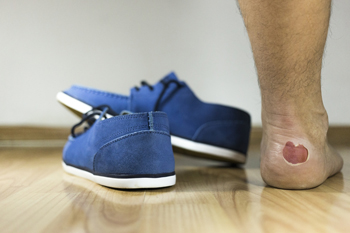
Foot blisters are defined as fluid-filled sacs that form on the skin, and are often encountered during daily activities or as a result of wearing ill-fitting footwear. They develop as a result of friction or repeated rubbing, which separates the layers of skin, creating a pocket of clear fluid. Several factors can contribute to the formation of foot blisters. Tight or improperly fitting shoes can lead to excessive rubbing, especially while walking or running. Moisture, such as sweat or wet conditions, softens the skin and makes it more prone to blistering. Certain materials consisting of rough socks or shoes, can exacerbate the problem. Additionally, activities that place excessive stress on the feet, like hiking or long-distance running, are common culprits. Understanding the definition and causes of foot blisters can help you take preventive measures. If you have blisters on your feet, it is suggested that you contact a podiatrist who can safely treat them and guide you on blister-prevention tactics.
Blisters are prone to making everyday activities extremely uncomfortable. If your feet are hurting, contact one of our podiatrists of Brondon Foot and Ankle. Our doctors can provide the care you need to keep you pain-free and on your feet.
Foot Blisters
Foot blisters develop as a result of constantly wearing tight or ill-fitting footwear. This happens due to the constant rubbing from the shoe, which can often lead to pain.
What Are Foot Blisters?
A foot blister is a small fluid-filled pocket that forms on the upper-most layer of the skin. Blisters are filled with clear fluid and can lead to blood drainage or pus if the area becomes infected.
How Do Blisters Form?
Blisters on the feet are often the result of constant friction of skin and material, usually by shoe rubbing. Walking in sandals, boots, or shoes that don’t fit properly for long periods of time can result in a blister. Having consistent foot moisture and humidity can easily lead to blister formation.
Prevention & Treatment
It is important to properly care for the affected area in order to prevent infection and ease the pain. Do not lance the blister and use a Band-Aid to provide pain relief. Also, be sure to keep your feet dry and wear proper fitting shoes. If you see blood or pus in a blister, seek assistance from a podiatrist.
If you have any questions, please feel free to contact our office located in Centerville, OH . We offer the newest diagnostic and treatment technologies for all your foot care needs.
